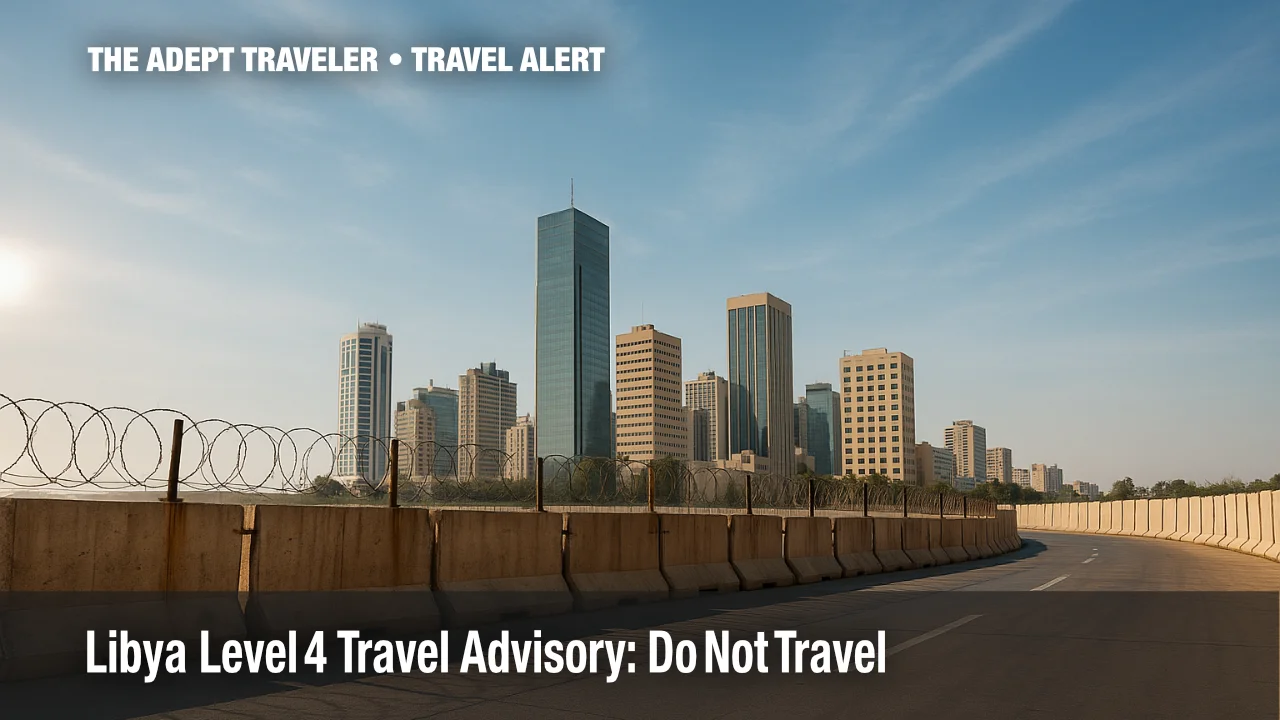The U. S. State Department re-issued its Level 4 "Do Not Travel" Libya travel advisory on July 16 2025 after a routine review. The Warning cites high levels of crime, terrorism, unexploded ordnance, Civil Unrest, kidnappings, and armed conflict. No end date is given, and officials say conditions remain too volatile for ordinary travel.
At-a-Glance: Severity: Warning, Affected Area: Libya nationwide, Effective: July 16, 2025 - Ongoing
Key Points
- Armed clashes and roadside explosives remain widespread outside secure compounds.
- Kidnapping rings target foreigners, including aid workers and businesspeople.
- Impact on travelers: commercial flights cancel without notice, and consular help is routed through Tunis.
- U. S. and U. K. governments advise private evacuation at the first safe opportunity.
What Is Happening - Libya Travel Advisory
Since the 2011 uprising, Libya has fractured into rival militia zones. Sporadic battles in Tripoli and Benghazi spill onto major roads and around airports, while unexploded mines litter both urban and desert routes. Terror groups such as ISIS-Libya exploit security gaps to stage bombings at hotels, markets, and government offices. The central bank struggles to pay salaries, fueling street crime and carjackings. Health care and emergency services function intermittently, leaving wounded civilians with limited options.
Official Guidance
The State Department's Level 4 notice instructs U. S. citizens not to enter Libya for any reason. Embassy operations remain suspended in Tripoli; routine consular assistance is provided by the U. S. Embassy in Tunis. The Federal Aviation Administration bans U. S. commercial flights through Libyan airspace, and the U. S. Coast Guard imposes special entry conditions on vessels that have visited Libyan ports. The U. K. Foreign, Commonwealth, and Development Office likewise advises against all travel, citing recent militia clashes and rocket attacks near Mitiga Airport. Most insurers void policies that disregard official warnings, and some airlines refuse boarding to passengers holding Libyan itineraries.
Practical Steps
- Leave promptly. If you are already in Libya, arrange private air or maritime evacuation through a trusted security firm.
- Register with STEP or FCDO's LOCATE. This ensures you receive real-time alerts and allows officials to track departures.
- Prepare finance contingencies. Cash remains king; ATMs often fail, and card networks are down outside select hotels.
- Harden personal communications. Use satellite phones with spare batteries, plus encrypted messaging apps that work on low bandwidth.
- Secure documentation. Keep three printed copies of your passport, visa, and proof-of-life information, stored separately.
- Re-route future plans. Consider Tunisia, Malta, or Egypt for essential North Africa business until the Libya security picture improves.
- For broader risk comparisons, consult our Global Travel Alerts hub before booking.
Final Thoughts
Libya remains one of the world's most dangerous destinations. Avoid nonessential travel, and if entry is unavoidable, employ professional close-protection and plan a rapid exit. The current Level 4 travel advisory shows no signs of easing. Travel regulations can change rapidly. Confirm requirements with official channels before departure.

